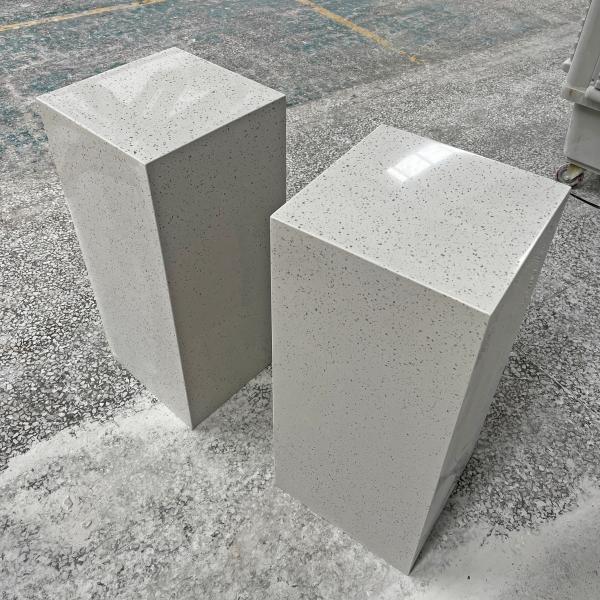
Solid Surface Countertops are widely used in modern home design for their excellent performance and aesthetic appearance. However, with the increasing awareness of environmental protection and the promotion of the concept of sustainability, consumers and designers are increasingly concerned about the environmental attributes and sustainability of materials, Solid Surface Countertops, as an emerging material, not only demonstrates the advantages of environmental protection in use, but also meets the requirements of sustainable development in its production and restoration process.

Environmental Properties of the Material
1. Renewable materials: Solid Surface Countertops are usually synthesized from natural minerals and acrylic or polyester resins. Modern producers of Solid Surface Materials are progressively adopting recycled materials and sustainable mining methods, which reduces reliance on raw materials while minimizing negative environmental impacts. For example, some Solid Surface products use recycled ore and recycled acrylic resins, which reduces waste and lowers raw material consumption.
2. Non-porous structure: Solid Surface materials have a non-porous structure, which means that countertops are less likely to absorb liquids or dirt. Non-porous materials reduce bacterial growth and increase hygiene levels, thus reducing the need for cleaning agents. Reducing the use of chemical cleaners not only protects the long-lasting beauty of the countertop, but also reduces environmental pollution.
Environmental contribution in the production process
1. Low energy production: The production process of Solid Surface Countertops generally involves low energy consumption. Compared to traditional stone processing, the manufacturing process for Solid Surface materials does not require high temperature heating or extensive mechanical processing, which reduces energy consumption and CO2 emissions. In addition, many manufacturers are working to use energy-efficient equipment and optimize production processes to further reduce their environmental footprint.
2. Waste Reduction: Solid Surface materials are produced in a process that allows for the recycling and reuse of waste materials. These scraps, which include trimmings cut during the manufacturing process, can be reprocessed into other Solid Surface products, reducing the amount of waste generated. This closed-loop production model helps to reduce the burden on the environment and increase the efficiency of resource utilization.
3. Long life and durability: Solid Surface Countertops are known for their excellent durability and wear resistance. Compared to other countertop materials, such as wood or natural stone, the long life of Solid Surface material reduces the frequency of replacement, which in turn reduces resource consumption and waste generation. Its long lifespan not only reduces the need for replacement, but also reduces the environmental impact of frequent replacement of countertops.
Environmental benefits during use
1. Easy to clean and maintain: The smooth, seamless surface of Solid Surface Countertops makes cleaning and maintenance easier. This not only reduces the amount of cleaners used, but also reduces the need for harmful chemicals. Its stain resistance and antimicrobial properties help to maintain a hygienic environment and reduce the negative impact on the environment.
2. Healthy Environment:Due to its antimicrobial properties, Solid Surface Countertops provide a healthier environment for use. This is especially important for family members, especially those with special health needs (e.g. infants, the elderly and people with weakened immune systems). A healthy living environment is not only good for the human body, but also in line with a sustainable lifestyle.
Restorative and Sustainable
1. Repairability and Extended Service Life:The repairability of Solid Surface Countertops is an important aspect of their environmental attributes. When a countertop is scratched or slightly damaged, it can be repaired by simple sanding and polishing to restore its original finish. This reparability significantly extends the life of the countertops and reduces the frequency of needing to replace them due to damage, thereby reducing resource consumption and waste generation.
2. Reprocessing and Reuse: At the end of a countertop's life, recycling and reuse of Solid Surface materials is also an important part of environmental protection. Some manufacturers and recycling companies specialize in processing Solid Surface material waste and reprocessing it into new products. In this way, old countertop materials are effectively reused, reducing the impact of waste on the environment.
Future Trends and Sustainability
1. Innovation and Green Production:With the advancement of technology, the production and design of Solid Surface materials are moving in a more environmentally friendly direction. Many companies are investing in research and development of greener production processes, using more sustainable raw materials, and developing more recyclable products. In the future, Solid Surface Countertops are expected to make even greater breakthroughs in environmental protection and sustainability.
2. Increased Consumer Awareness: As consumers become more environmentally conscious, the demand for sustainable products is increasing, and Solid Surface Countertops are becoming the choice of more and more consumers due to their environmentally friendly performance and long service life. This market trend has pushed material manufacturers and designers to pay more attention to environmental protection and sustainability, providing more possibilities for green homes and commercial spaces in the future.
Solid Surface Countertops stand out in modern home and commercial design for their superior environmental performance and sustainability. From low energy consumption and waste reduction during production, to ease of cleaning and a healthy environment during use, to restorative capabilities and reuse for sustainability, Solid Surface materials demonstrate their care for the environment at every turn. With continuous technological innovation and increased consumer environmental awareness, Solid Surface Countertops will continue to promote green building and sustainable development in the future, becoming the perfect combination of environmental protection and aesthetics.